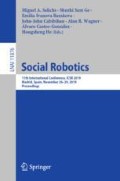Abstract
Robostress is a user’s perceived or measured stress in relation to the use of interactive physical robots. It is an offshoot from technostress where a user perceives experience of stress when using technologies. We explored robostress and the related variables. The methods consisted of a cross-sectional survey conducted in Finland, Qatar and Japan among university students and staff members (n = 60). The survey data was analyzed with descriptive statistics and a Pearson Correlation Test. The results presented that people perceived stress when or if using the robots and the concept of robostress exists. The reasons for robostress were lack of time and technical knowledge, but the experience of technical devices and applications mitigate robostress.
Access this chapter
Tax calculation will be finalised at checkout
Purchases are for personal use only
References
Viola, R.: Artificial intelligence (AI) and robotics will be a key driver of economic and productivity growth in the future. The Parliament Magazine (2017). https://www.theparliamentmagazine.eu/printpdf/6255
Chakravorti, B., Bhalla, A., Chaturvedi, R.S.: 60 Countries’ digital competitiveness, indexed. Harvard Bus. Rev (2017). https://hbr.org/2017/07/60-countries-digital-competitiveness-indexed
Mühleisen, M.: The long and short of the digital revolution. Finan. Dev. 55(2), 4–8 (2018)
Furman, J., Seamans, R.: AI and the Economy. NBER Working Paper Series. Working Paper 24689. National Bureau of Economics Research. Cambridge, US (2018). http://www.nber.org/papers/w24689
Stacey, N., Ellwood, P., Bradbrook, S., Reynolds, J., Williams, H., Lye, D.: Foresight on new and emerging occupational safety and health risks associated with digitalisation by 2025. European Agency for Safety and Health at Work, Luxemburg (2018)
Tarafdar, M., Tu, Q., Ragu-Nathan, T.S.: Impact of technostress on end-user satisfaction and performance. J. Manag. Inf. Syst. 27(3), 303–334 (2010)
Ragu-Nathan, T.S., Tarafdar, M., Ragu-Nathan, B.S., Qiang, T.: The consequences of technostress for end users in organizations: conceptual development and empirical validation. Inf. Syst. Res. 1(4), 417–433 (2008)
Arai, T., Kato, R., Fujita, M.: Assessment of operator stress induced by robot collaboration in assembly. CIRP Ann. Manufact. Technol. 59(1), 5–8 (2010)
Taniguchi, K., et al.: Method for objectively evaluating psychological stress resulting when humans interact with robots. In: Advances in Human-Robot Interaction (2009)
Sims, J., Vashishtha, D., Rani, P., Brackin, R., Sarkar, N.: Stress detection for implicit human-robot co-operation. In: Proceedings of the 5th Biannual World Automation Congress, pp. 567–572 (2002)
Dang, T.-H., Tapus, A.: Coping with stress using social robots as emotion-oriented tool: potential factors discovered from stress game experiment. In: Herrmann, G., Pearson, M.J., Lenz, A., Bremner, P., Spiers, A., Leonards, U. (eds.) ICSR 2013. LNCS (LNAI), vol. 8239, pp. 160–169. Springer, Cham (2013). https://doi.org/10.1007/978-3-319-02675-6_16
European Commission: Artificial Intelligence for Europe. European Commission, Brussels (2018). https://ec.europa.eu/transparency/regdoc/rep/1/2018/EN/COM-2018–237-F1-EN-MAIN-PART-1.PDF
Stacey, N., Ellwood, P., Bradbrook, S., Reynolds, J., Williams, H.: Key trends and drivers of change in information and communication technologies and work location. European Agency for Safety and Health at Work, Luxemburg (2017). http://www.wtec.org/robotics/report/05-Industrial.pdf
Thomée, S., Härenstam, A., Hagberg, M.: Computer use and stress, sleep disturbances, and symptoms of depression among young adults – a prospective cohort study. BMC Psychiatry 12, 176 (2012)
Salomonsson, S., Hedman-Lagerlöf, E., Öst, L.-G.: Sickness absence: a systematic review and meta-analysis of psychological treatments for individuals on sick leave due to common mental disorders. Psychol. Med. 48(12), 1954–1996 (2018)
Bordi, L., Okkonen, J., Mäkiniemi, J.-P., Heikkilä-Tammi, K.: Communication in the digital work environment: implications for Wellbeing at work. Nord. J. Working Life Stud. 8(3), 29–48 (2018)
Ayyagari, R., Grover, V., Purvis, R.: Technostress: technological antecedents and implications. MIS Q. 35(4), 831–858 (2011)
Tech Data: Is “technostress” making workers less productive? (2018). https://www.techdatanewsflash.co.uk/trendingit/is-technostress-making-workers-less-productive/376
Brod, C.: Techno Stress: The Human Cost of the Computer Revolution. Addison-Wesley, Reading (1984)
Berg, M., Arnetz, B.B., Liden, S., Eneroth, P., Kallner, A.: Technostress. A psychophysiological study of employees with VDU-associated skin complaints. J. Occup. Med. 34(7), 698–701 (1992)
Weil, M., Rosen, L.: Techno Stress: Coping with Technology @Work @Home @Play. Wiley, New York (1997)
Hudiburg, R.A.: Assessing and managing technostress (1996). http://www.una.edu/psychology/alakslk.html
Owusu-Ansah, S., Azasoo, J., Adu, I.: Understanding the effects of technostress on the performance of banking staff. Int. J. Bus. Continuity Risk Manag. 6(3), 222–237 (2016)
Hampton, K.N., Rainie, L., Lu, W., Shin, I., Purcell, K.: Social media and the cost of caring. Pew Research Center, Washington, DC (2014). https://www.pewresearch.org/wp-content/uploads/sites/9/2015/01/PI_Social-media-and-stress_0115151.pdf
Sethi, V., King, R., Campbell Quick, J.: What causes stress in information system professionals? Commun. ACM 47(3), 99–102 (2004)
Maeir, C.: Technostress. Theoretical foundation and empirical evidence. Ph.D. Dissertation, University of Bamberg, Germany (2014)
Wang, K., Shu, Q., Tu, Q.: Technostress under different organizational environments: an empirical investigation. Comput. Hum. Behav. 24(6), 3002–3013 (2008)
Bakker, A., Boyd, C., Dollard, M., Gillespie, N., Winefield, A., Stough, C.: The role of personality in the job demands-resources model: a study of Australian academic staff. Career Dev. Int. 15(7), 22–636 (2010)
Vänni, K., et al.: The Presenteeism Scale as a measure of productivity loss. Occup. Med. (Lond.) 68(8), 512–518 (2018)
Ge, S.S.: Social robotics: integrating advances in engineering and computer science. In: Proceedings of Electrical Engineering/Electronics, Computer, Telecommunications and Information Technology International Conference, pp. 9–12 (2007)
Author information
Authors and Affiliations
Corresponding author
Editor information
Editors and Affiliations
Rights and permissions
Copyright information
© 2019 Springer Nature Switzerland AG
About this paper
Cite this paper
Vänni, K.J., Salin, S.E., Cabibihan, JJ., Kanda, T. (2019). Robostress, a New Approach to Understanding Robot Usage, Technology, and Stress. In: Salichs, M., et al. Social Robotics. ICSR 2019. Lecture Notes in Computer Science(), vol 11876. Springer, Cham. https://doi.org/10.1007/978-3-030-35888-4_48
Download citation
DOI: https://doi.org/10.1007/978-3-030-35888-4_48
Published:
Publisher Name: Springer, Cham
Print ISBN: 978-3-030-35887-7
Online ISBN: 978-3-030-35888-4
eBook Packages: Computer ScienceComputer Science (R0)

